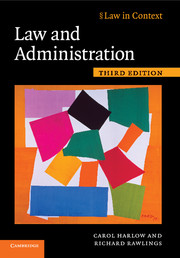Book contents
- Frontmatter
- Contents
- Preface
- Table of Cases
- Table of Statutes
- 1 Red and green light theories
- 2 The changing state
- 3 Transforming judicial review
- 4 Making the law
- 5 Rules and discretion
- 6 Regulation and governance
- 7 Regulatory design and accountability
- 8 Contractual revolution
- 9 Contract, contract, contract
- 10 Into the jungle: Complaints, grievances and disputes
- 11 Tribunals in transition
- 12 The Parliamentary Ombudsman: Firefighter or fire-watcher?
- 13 Inquiries: A costly placebo?
- 14 Continuity and change: Procedural review
- 15 Elite dimension: Court structures and process
- 16 Judicial review and administration: A tangled web
- 17 ‘Golden handshakes’: Liability and compensation
- Index
3 - Transforming judicial review
Published online by Cambridge University Press: 05 June 2012
- Frontmatter
- Contents
- Preface
- Table of Cases
- Table of Statutes
- 1 Red and green light theories
- 2 The changing state
- 3 Transforming judicial review
- 4 Making the law
- 5 Rules and discretion
- 6 Regulation and governance
- 7 Regulatory design and accountability
- 8 Contractual revolution
- 9 Contract, contract, contract
- 10 Into the jungle: Complaints, grievances and disputes
- 11 Tribunals in transition
- 12 The Parliamentary Ombudsman: Firefighter or fire-watcher?
- 13 Inquiries: A costly placebo?
- 14 Continuity and change: Procedural review
- 15 Elite dimension: Court structures and process
- 16 Judicial review and administration: A tangled web
- 17 ‘Golden handshakes’: Liability and compensation
- Index
Summary
Beginnings
Kenneth Culp Davis, a leading American academic visiting England in the 1960s, described English judicial review as restricted by an old-fashioned, positivist corset ‘astonishing to one with a background in the American legal system’. English judges strove to avoid consideration of the policy aspects of the issues they decided and the typical lawyer:
responds with consternation to an inquiry into the soundness of the policies embodied in a judicial decision, and, if he persists, the inquirer is gently reminded that judges do not consider policy questions and that only Parliament can change the law; the task of the judge is wholly analytical – to discover the previously existing law, and to apply it logically to the case before the court.
Not only were judges precluded from considering ‘policy questions’ but the lawmaking powers of the judiciary were scarcely recognised. The judicial function was seen as limited to ‘discovering’ previously existing law and applying it logically to the case before the court. A strict interpretation of the doctrine of precedent inhibited rapid changes of direction and it was accepted that only Parliament could change the law. As Lord Reid (perhaps too modestly) put it, if doctrine had developed in such a way as to cause injustice, appellate judges should, if they could, ‘get the thing back on the rails’, but ‘if it has gone too far we must pin our hopes on Parliament’. Jaffé attributed the different behaviour of English and American judges to constitutional factors; it had always been anticipated that the federal American judge would ‘assume a role in the polity far greater than that played by his confrère in Britain’.
- Type
- Chapter
- Information
- Law and Administration , pp. 95 - 139Publisher: Cambridge University PressPrint publication year: 2009
- 1
- Cited by



